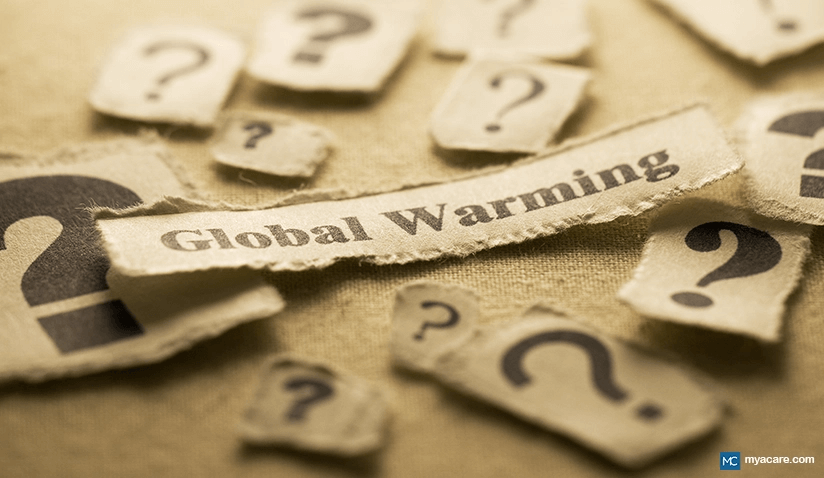How Global Warming Is Harming Our Health and What We Can Do About It

Medically Reviewed by Dr. Rosmy Barrios - September 02, 2024
Global warming refers to the gradual increase in the Earth's average surface temperature over time. This rise in temperature disrupts the planet's climate systems, leading to a cascade of detrimental effects.
The cause of global warming is thought to be an increase in greenhouse gases, such as nitrous dioxide, methane, and nitric oxide. Dubbed the “greenhouse effect,” these keep extra heat from escaping into space and instead trap it in the atmosphere. While it is possible for global temperatures to rise naturally over thousands of years in line with the Earth’s cycle, human activities are thought to speed the process up, further increase the temperature, and cause unnecessary damage to the environment. Burning fossil fuels, deforestation, industrial processes, waste removal, and agricultural practices greatly expand the greenhouse effect and contribute to making life unsustainable on the planet.[1]
Global warming is important due to its destructive impact on the environment, such as melting ice caps, rising sea levels, ecosystem disruption, and a loss of biodiversity. The phenomenon has subsequently been renamed to climate change, as the rise in global temperature appears to have widespread effects on overall weather patterns. Climate change has been linked to a higher occurrence of droughts, wildfires, heavy rainfall, floods, and other extreme weather events.
Yet, perhaps the worst aspect of climate change would be the threat it poses to our health. In this article, we will address how global warming affects health and what you can do to help prevent the problem.
Health Issues Caused by Global Warming
We are currently living in the warmest period of recorded history. While not completely obvious yet, the health effects of global warming are beginning to be noticed all over the globe.[2]
Global warming affects our health in many ways, some of which include[3]:
- Heat-related illnesses: The risk of heat exhaustion, heat stroke, dehydration, and heat cramps increases as the temperature rises. These conditions can be fatal, especially for the elderly, children, and people with chronic diseases. According to the World Health Organization (WHO), heat stress is projected to cause an additional 38,000 annual deaths worldwide in the elderly between 2030 and 2050.[4]
- Infectious diseases: Global warming alters the distribution and activity of disease vectors, such as mosquitoes, ticks, and rodents that carry pathogens, causing diseases like malaria, dengue fever, Lyme disease, zika virus, and plague. The changing climate also creates favorable conditions for fungal infections, such as valley fever and cryptococcosis. According to the WHO’s estimates, climate change will cause an additional 250,000 deaths per year from malaria, diarrhea, malnutrition, and heat stress between 2030 and 2050.[5]
- Air quality: The increasing formation of ground-level ozone, a harmful component of smog, further exacerbates air pollution (a critical factor concerning climate change and health).
Ground-level ozone irritates the lungs and causes respiratory problems, such as asthma, bronchitis, and emphysema[6]. The higher frequency and intensity of wildfires produce smoke and particulate matter that can impair lung function and increase the risk of cardiovascular conditions.
- Waterborne diseases: The amount and quality of water resources can be impacted by droughts, floods, storms, and rising sea levels, particularly if they occur frequently and are more severe than usual. These events can contaminate water sources with pathogens, chemicals, and toxins that cause diseases like cholera, typhoid fever, hepatitis A, and dysentery. There is also an increased risk of algal blooms, which produce toxins that can harm humans, animals, and marine life.
- Food safety: Food production and security are also at risk in the future due to climate change, which can lower crop yields and water availability and increase pest infestations and soil erosion. These elements can affect both the quantity and quality of food while raising the danger of toxins, parasites, and bacteria that cause foodborne illnesses. Global warming also affects food storage and transportation by increasing the frequency of electrical storms, power outages, and exposure to high temperatures and humidity that can spoil food and cause food poisoning.
- Mental Health: Global warming affects mental health by causing stress, anxiety, depression, post-traumatic stress disorder (PTSD), and suicidal ideation[7]. These effects can be triggered by direct exposure to extreme weather events and natural disasters capable of damaging property, harming people, and increasing mortality rates. Indirect exposure to social disruption, economic losses, displacement, civil unrest, potential violence, and environmental degradation may also give rise to regional mental health issues. The extreme weather patterns associated with climate change may also affect cognitive function by impairing memory, attention span, and decision-making.
Call to Action for Urgent Climate Action and Prioritizing Health in Global Policies
Global warming is simultaneously an environmental issue and a public health emergency. For global temperature rise to be kept well below 2°C above pre-industrial levels, immediate action is needed at all societal levels to reduce greenhouse gas emissions. However, reducing emissions alone is not enough.
The unavoidable impacts of global warming on our health and well-being need to be accounted for throughout global healthcare systems. Steps ought to be taken in every sector to improve surveillance, preparedness and response capacities. Healthcare can be strengthened by incorporating early warning systems and better access to facilities. Health education and awareness can help encourage local and global improvements in these regards and support climate change healthcare initiatives.
Health in global policies needs to be prioritized and integrated into all aspects of climate action. To address this, the UN has established the United Nations Framework Convention on Climate Change (UN-FCCC), which is a legally binding treaty that aims to shield people from the harmful impacts of climate change.[8] The UN-FCCC also provides a platform for cooperation and collaboration among countries and stakeholders to address the health challenges posed by global warming.
Combating Climate Change: 10 Things You Can Do to Help
At the local level, individuals and communities can get active and help to support their health and that of the planet at large. This can be done by making informed choices about what we eat, how we travel, how we use energy, how we dispose of waste, and how we cope with stress.
Here is a list of 10 things you can do to help lessen the health effects of climate change[9]:
- Reduce energy consumption by employing energy-efficient techniques and appliances.
- Cut down on single-use plastics, opt for biodegradable packaging, and reduce waste through recycling and composting.
- Help to clean the environment by picking up litter and disposing of waste properly.
- Support sustainable transportation options like walking, biking, and public transit.
- Conserve water by fixing leaks and using water-saving appliances.
- Support initiatives that protect forests or combat deforestation, plant trees, and maintain green spaces to capture carbon dioxide.
- Advocate for policies that promote environmental protection and greenhouse gas reductions.
- Make informed choices about what you eat that are sustainable, favoring local, organic, and plant-based options.
- Support a transition to renewable energy sources that do not cause as much environmental damage, such as solar and wind power.
- Join and support other local initiatives or movements that advocate for climate action and health equity.
Conclusion
The health of present and future generations is threatened by global warming. However, it is not too late to create a healthier and more sustainable world. We have the power and the responsibility to make a difference.
To search for the best doctors and healthcare providers worldwide, please use the Mya Care search engine.
The Mya Care Editorial Team comprises medical doctors and qualified professionals with a background in healthcare, dedicated to delivering trustworthy, evidence-based health content.
Our team draws on authoritative sources, including systematic reviews published in top-tier medical journals, the latest academic and professional books by renowned experts, and official guidelines from authoritative global health organizations. This rigorous process ensures every article reflects current medical standards and is regularly updated to include the latest healthcare insights.

Dr. Rosmy Barrios is an aesthetic medicine specialist with international work experience. She earned her physician diploma at the Universidad Del Norte’s School of Medicine in Barranquilla, Colombia, and her specialty at John F. Kennedy University in Buenos Aires, Argentina. Dr. Barrios is a member of the Pan-American Aesthetic Medicine Association (PASAM) and the Union Internationale de Médecine Esthétique (UIME). She is an expert health writer with keen interests in aesthetic medicine, regenerative aesthetics, anti-aging, fitness, and nutrition. Currently, Dr. Barrios heads the Regenerative Aesthetics department at a renowned Internal Medicine clinic based in Belgrade, Serbia.
Sources:
Featured Blogs



